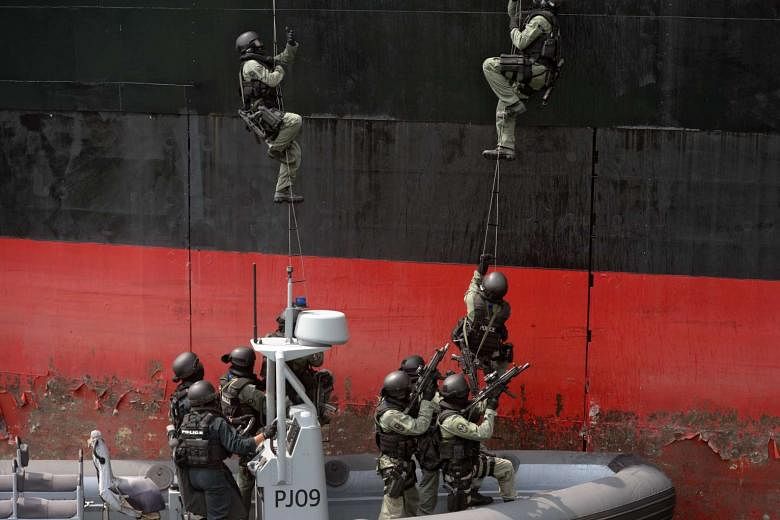SINGAPORE - A new fast response police unit that is tactically trained, mentally prepared and equipped to respond to a terrorist attack, is being formed to beef up Singapore's security response to the terror threat.
These Emergency Response Teams (ERT) will be able to respond to attacks carried simultaneously at multiple locations. They will be specially trained with counter-assault skills, and equipped with the necessary weapons.
It is one of the three key initiatives that Singapore will roll out to fight terrorism, said Home Affairs Minister K. Shanmugam in a speech to senior Home Team officials on Friday (March 18). He warned that the threat of a terrorist attack is at its highest level yet.
"When an attack takes place, the speed and manner in which we respond will be critical," said Mr Shanmugam. He noted that during the Paris attacks last November, there were substantial periods when the terrorist operated with little or no hindrance.


The Home Team will also develop and launch a new national programme named SG Secure later this year, to rally the community.
This new movement will be a revamp of the 10-year-old Community Engagement Programme (CEP), which was meant to foster social cohesion and unity.
"There is a strong, urgent need for the community to be vigilant before and during an attack," Mr Shanmugam said. "A community that knows how to respond, a community that is prepared and equipped with the necessary skills to protect themselves, their families and the community."
The Home Team will work with partners to develop programmes to raise awareness and train different groups of Singaporeans.
The aim is for them to play an active role in keeping Singapore safe, by staying alert to possible threats, cherishing Singapore's multiracial and multireligious social fabric, and being resilient if a crisis occurs.
"If an attack occurs, we need to be able to recover well. The day after is even more important. We have to emerge stronger, more united and determined as Singaporeans," Mr Shanmugam said.
The network of closed circuit television (CCTV) cameras will also be significantly expanded over the next four years, to ramp up surveillance and deter those plotting terror attacks in Singapore.
The Government will, where necessary, pass laws to require building owners and organisers of major events to step up security, said Mr Shanmugam.
Police cameras will be installed at 10,000 HDB blocks and multistorey carparks by this year, he said.
Electronic eyes will be put up at common heartland areas next, especially in crowded places such as town centres, hawker centres and walkways to major transport nodes.
The Straits Times understands that another 11,000 cameras will be installed over the next four years, on top of the 65,000 police cameras that will be in place by this year.
Apart from police cameras, footage from other CCTVs will be made available to police on demand, including those monitoring the public transport system, commercial buildings with high footfall, and government buildings, he said.
Crowdsourcing platforms will also be set up for members of the public to send videos to the police.
"This is a necessary, strategic and direct response to the evolving nature of the threats," Mr Shanmugam said.
Citing how tight security at the Stade de France stadium and a larger mall in Jakarta had helped foil planned attacks there, Mr Shanmugam said new laws will be passed where needed to enhance security at buildings and major events.
A series of coordinated attacks in Paris last November left more than 120 people dead and another 300 injured. A bombing near the Stade de France killed three people.
Mr Shanmugam said strict security checks had deterred three suicide bombers from entering the stadium. "Imagine the consequences if they had managed to get into the stadium and them exploded themselves," he said.
As for the Jakarta attacks in January near the popular Sarinah mall that killed two bystanders and injured more than 20 others, Mr Shanmugam said the militants had apparently targeted a larger mall nearby but abandoned their original plan due to tight security there.
In Singapore, developers of large-scale projects will be asked to factor in security considerations at the design stage. Building owners could be asked to install CCTVs, and there will be security screenings at major events.
Ramping up security will increase building and operating costs, but this cannot be avoided, he said.
"There are good reasons for requiring these measures," Mr Shanmugam said. "Terrorist attacks in other places have focused on soft targets because there was little or no security protection."


